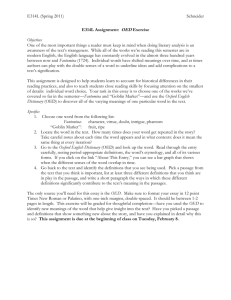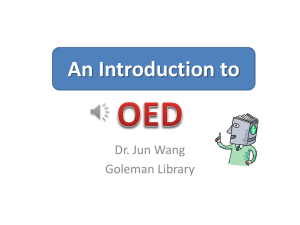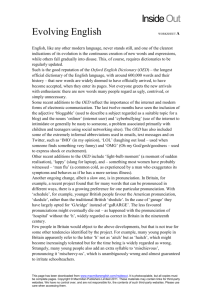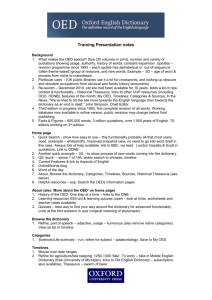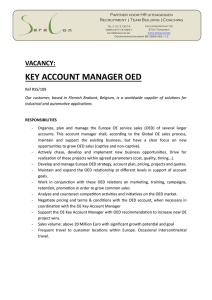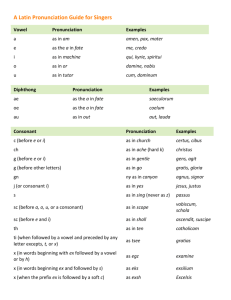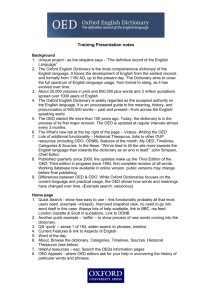Evolving English WORKSHEET A
advertisement
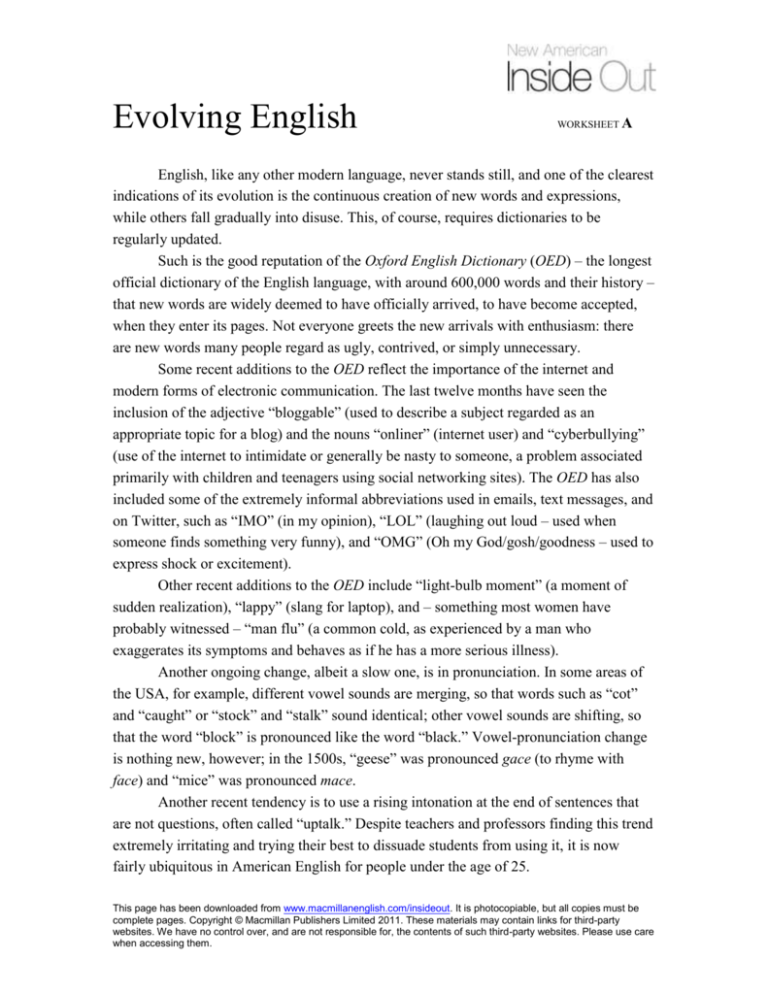
Evolving English WORKSHEET A English, like any other modern language, never stands still, and one of the clearest indications of its evolution is the continuous creation of new words and expressions, while others fall gradually into disuse. This, of course, requires dictionaries to be regularly updated. Such is the good reputation of the Oxford English Dictionary (OED) – the longest official dictionary of the English language, with around 600,000 words and their history – that new words are widely deemed to have officially arrived, to have become accepted, when they enter its pages. Not everyone greets the new arrivals with enthusiasm: there are new words many people regard as ugly, contrived, or simply unnecessary. Some recent additions to the OED reflect the importance of the internet and modern forms of electronic communication. The last twelve months have seen the inclusion of the adjective “bloggable” (used to describe a subject regarded as an appropriate topic for a blog) and the nouns “onliner” (internet user) and “cyberbullying” (use of the internet to intimidate or generally be nasty to someone, a problem associated primarily with children and teenagers using social networking sites). The OED has also included some of the extremely informal abbreviations used in emails, text messages, and on Twitter, such as “IMO” (in my opinion), “LOL” (laughing out loud – used when someone finds something very funny), and “OMG” (Oh my God/gosh/goodness – used to express shock or excitement). Other recent additions to the OED include “light-bulb moment” (a moment of sudden realization), “lappy” (slang for laptop), and – something most women have probably witnessed – “man flu” (a common cold, as experienced by a man who exaggerates its symptoms and behaves as if he has a more serious illness). Another ongoing change, albeit a slow one, is in pronunciation. In some areas of the USA, for example, different vowel sounds are merging, so that words such as “cot” and “caught” or “stock” and “stalk” sound identical; other vowel sounds are shifting, so that the word “block” is pronounced like the word “black.” Vowel-pronunciation change is nothing new, however; in the 1500s, “geese” was pronounced gace (to rhyme with face) and “mice” was pronounced mace. Another recent tendency is to use a rising intonation at the end of sentences that are not questions, often called “uptalk.” Despite teachers and professors finding this trend extremely irritating and trying their best to dissuade students from using it, it is now fairly ubiquitous in American English for people under the age of 25. This page has been downloaded from www.macmillanenglish.com/insideout. It is photocopiable, but all copies must be complete pages. Copyright © Macmillan Publishers Limited 2011. These materials may contain links for third-party websites. We have no control over, and are not responsible for, the contents of such third-party websites. Please use care when accessing them. Evolving English WORKSHEET B Exercise 1 Complete the crossword below. If all the words are correct, another new word that recently entered the Oxford English Dictionary will read from top to bottom. It means a vacation for which you don’t travel abroad but instead remain in your own country, perhaps not even leaving your local area. 1 2 3 4 5 6 7 8 9 10 1. According to the text, not everyone is ___________ about all the new words and expressions that enter the Oxford English Dictionary. 2. Two words that are often pronounced the same in American English are “stock” and “___________.” 3. The tendency to make your voice rise at the end of sentences so that statements sound like questions is called “___________.” 4. About 500 years ago, “geese” used to ___________ with “face” in English. 5. Man flu is really nothing more than a ___________. 6. Cyberbullying is not associated primarily with ___________. 7. Parts of the USA are undergoing a vowel ___________, which means that some vowels have started to be pronounced like other vowels were in the past. 8. “LOL” is an example of a popular ___________ . 9. The English language is ___________ continuously. 10. Someone who ___________ sees how they can solve a difficult problem could be said to have had a light-bulb moment. This page has been downloaded from www.macmillanenglish.com/insideout. It is photocopiable, but all copies must be complete pages. Copyright © Macmillan Publishers Limited 2011. These materials may contain links for third-party websites. We have no control over, and are not responsible for, the contents of such third-party websites. Please use care when accessing them. Evolving English WORKSHEET C Exercise 2 The text from Worksheet A has been copied below, but now contains one mistake on each line. Can you find the mistakes and correct them? English, like any other modern language, never stands ill, and one of the clearest indications of its revolution is the continuous creation of new words and expressions, while others fall gradually into misuse. This, of course, requires dictionaries to be regular updated. So is the good reputation of the Oxford English Dictionary (OED) – the longest official dictionary of English language, with around 600,000 words and their history – that new words are widely deeled to have officially arrived, to have become accepted, when they enter it’s pages. Not everyone greets the new arrivals with enthusiasm: there are new words many people regard as ugly, contrived, or simple unnecessary. Some recent adds to the OED reflect the importance of the internet and modern forms of electric communication. The last twelve months have seen the include of the adjective “bloggable” (used to describe a subject regarded as an appropriate topic for a blog) and the nowns “onliner” (internet user) and “cyberbullying” (use of the internet to timidate or generally be nasty to someone, a problem associated primarily with children and teenagers using society networking sites). The OED has also included some of the extremely formal abbreviations used in emails, text messages, and on Twitter, such as “IMO” (in my opinion), “LOL” (laughing on loud – used when someone find something very funny), and “OMG” (Oh my God/gosh/goodness – used to express shock or excited). Other recent additions to the OED includes “light-bulb moment” (a moment of sudden realization), “lappy” (sang for laptop), and – something most women have probably witnessed – “man flu” (a comon cold, as experienced by a man who exaggerates its symptoms and behaves if he has a more serious illness). Another going change, albeit a slow one, is in pronunciation. In some areas of the USA, for example, different vowel sounds are managing, so that words such as “cot” and “caught” or “stock” and “stalk” sounds identical; other vowel sounds are shifting, so that the word “block” is pronounced like the word “brock.” Vowel-pronunciation change is nothing now, however; in the 1500s, “geese” was pronounced gace (to rhyme with face) and “mice” pronounced mace. Another recent tendency is to use a rising indentation at the end of sentences that are questions, often called “uptalk.” Despite teachers and professors finding this trend extremely irritating and trying their worst to dissuade students from using it, it is now fairly ubiquitous in American English for papal under the age of 25. This page has been downloaded from www.macmillanenglish.com/insideout. It is photocopiable, but all copies must be complete pages. Copyright © Macmillan Publishers Limited 2011. These materials may contain links for third-party websites. We have no control over, and are not responsible for, the contents of such third-party websites. Please use care when accessing them. Evolving English WORKSHEET D Exercise 3 Below are some words and expressions, with explanations of their meaning. Some are genuine recent additions to the Oxford English Dictionary, and some have been made up. Decide if they are real (R) or fictitious (F), then bet a minimum of 10 points up to a maximum of 50 on your choice. Real/ Fictitious 1 internetter (noun): internet user 2 storming (adjective, informal): great, excellent 3 WAGs (noun, plural, informal): abbreviation for “wives and girlfriends.” Usually they are the wives and girlfriends of men who are celebrities (often famous sportsmen), and might themselves be quite glamorous and/or well known. SSI: abbreviation for “such a stupid idea,” used in emails, etc. 4 5 TBH: abbreviation for “to be honest,” used in emails, etc. 6 vuvuzela (noun): plastic horn that South African soccer fans like to blow. The word, and the noise associated with it, became well known to TV viewers worldwide during the 2010 World Cup in South Africa. fake foreigner (expression, informal): someone who looks foreign but isn’t toxic debt (expression): debt that a person, institution, or country is unlikely to be able to pay. The word has often been used since the 2008 global financial crisis. chocolate bank (expression, informal): bank that seems to be a good place to put your money but is actually a very risky place. The word has often been used since the 2008 global financial crisis. tanorexia (noun, informal): an obsessive desire to get a suntan 7 8 9 10 Points bet Points lost Points won Total points lost and won Final total (subtract total points lost from total points won) This page has been downloaded from www.macmillanenglish.com/insideout. It is photocopiable, but all copies must be complete pages. Copyright © Macmillan Publishers Limited 2011. These materials may contain links for third-party websites. We have no control over, and are not responsible for, the contents of such third-party websites. Please use care when accessing them. Evolving English WORKSHEET E English, like any other modern language, never stands still, and one of the clearest indications of its evolution is the continuous creation of new words and expressions, while others fall gradually into disuse. This, of course, requires dictionaries to be regularly updated. Such is the good reputation of the Oxford English Dictionary (OED) – the longest official dictionary of the English language, with around 600,000 words and their history – that new words are widely deemed to have officially arrived, to have become accepted, when they enter its pages. Not everyone greets the new arrivals with enthusiasm: there are new words many people regard as ugly, contrived, or simply unnecessary. Some recent additions to the OED reflect the importance of the internet and modern forms of electronic communication. The last twelve months have seen the inclusion of the adjective “bloggable” (used to describe a subject regarded as an appropriate topic for a blog) and the nouns “onliner” (internet user) and “cyberbullying” (use of the internet to intimidate or generally be nasty to someone, a problem associated primarily with children and teenagers using social networking sites). The OED has also included some of the extremely informal abbreviations used in emails, text messages, and on Twitter, such as “IMO” (in my opinion), “LOL” (laughing out loud – used when someone finds something very funny), and “OMG” (Oh my God/gosh/goodness – used to express shock or excitement). Other recent additions to the OED include “light-bulb moment” (a moment of sudden realization), “lappy” (slang for laptop), and – something most women have probably witnessed – “man flu” (a common cold, as experienced by a man who exaggerates its symptoms and behaves as if he has a more serious illness). Another ongoing change, albeit a slow one, is in pronunciation. In some areas of the USA, for example, different vowel sounds are merging, so that words such as “cot” and “caught” or “stock” and “stalk” sound identical; other vowel sounds are shifting, so that the word “block” is pronounced like the word “black.” Vowel-pronunciation change is nothing new, however; in the 1500s, “geese” was pronounced gace (to rhyme with face) and “mice” was pronounced mace. Another recent tendency is to use a rising intonation at the end of sentences that are not questions, often called “uptalk.” Despite teachers and professors finding this trend extremely irritating and trying their best to dissuade students from using it, it is now fairly ubiquitous in American English for people under the age of 25. This page has been downloaded from www.macmillanenglish.com/insideout. It is photocopiable, but all copies must be complete pages. Copyright © Macmillan Publishers Limited 2011. These materials may contain links for third-party websites. We have no control over, and are not responsible for, the contents of such third-party websites. Please use care when accessing them.
